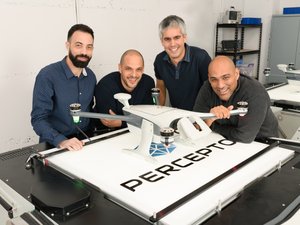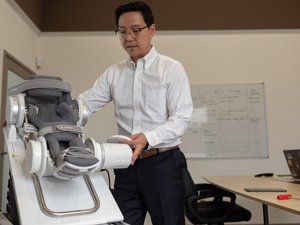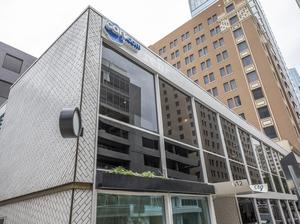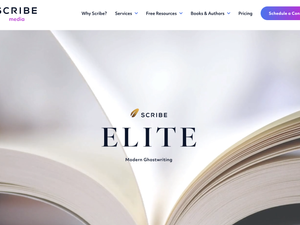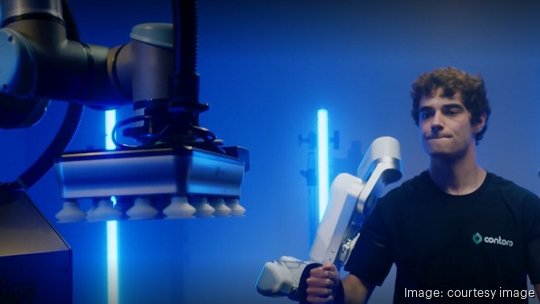
A new robotics startup is poised to begin its first pilot project at a warehouse in Austin. And it also has a fresh batch of venture capital dollars to help it advance its research and development, as well as explore new industry verticals.
Contoro Robotics, which spun out of medical robotics startup Harmonic Bionics, has raised $6 million in venture backing. The company, led by founder and CEO Youngmok (Mok) Yun, was created last year when Harmonic Bionics, which uses robotics to assist stroke survivors in physical therapy, discovered warehouse applications for its technologies.
Its primary technology is the artificial intelligence and remote control operation of third-party robotic arms. In one demonstration, its AI automation is shown controlling a Kuka brand robot to quickly move a stack of dozens of boxes onto a pallet. As it moves each box, it also scans labels and tracks other metrics. It performs those same maneuvers from shipping containers, which remain the primary form of shipping for a majority of products from ships, trains and trucks.
Meanwhile, Contoro's product also manages situations that AI cannot. A human can sit in a chair equipped with a robotic arm, just like Harmonic Bionic's therapy assist bot, and remotely control the robotic arm. That's useful in situations where boxes have shifted or spilled over in a warehouse or shipping container. Once the human moves the arm onto a box, the AI can take over again and correctly place it on a pallet or other location.
"Our goal is to introduce our advanced intelligence to this very good robotic arm, and we want to bring this robotic arm to many different applications," Yun said.
Yun's work as a PhD student at The University of Texas led to Harmonic Bionics, where he was a co-founder and CEO before shifting to chief technology officer as he launched Contoro. While developing Harmonic Bionics took about seven years, creating Contoro took only a year and half because of the team's prior work with robotics. The two companies share an office space in North Austin near the Domain.
"What's exciting for Contoro is that we can we have access to a lot more resources that other companies in our development [stage] probably either A) wouldn't have or B) would have to use a lot of capital to obtain," said John Cook, Contoro's business development manager.
Yun said Contoro's fundamental idea is to control the robot most of the time with AI. When AI is not perfect it basically combines the AI and human intelligence.
"Then the AI can learn tele-operated motions, and the next time AI can be smarter," he said.
Its first pilot project is with Calendar Holdings LLC, an Austin company that operates retail brands, including Go!, Calendars.com and Fuego.
Contoro raised an initial $1.3 million funding round last year led by Village Global, an investment firm with partners including Bill Gates, Jeff Bezos, Mark Zuckerberg and Michael Dell, along with leaders from LinkedIn, VMware, Pinterest and many other big tech companies.
More recently, Contoro raised a $4.7 million seed round. That was led by South Korean firm SV Investment, which invests in deep-tech startups globally. Other backers include the Kakao Ventures, Bass Investment, Future Play, UT Seed Fund and angel investors.
Contoro currently has 15 employees, almost entirely on the engineering and development side of the business. Many of its employees were people Yun knew from UT; he said he didn't even have to interview most of them.
Yun said the company is well aware of the conversations around the dangers of AI, and the company advances very cautiously with its products.
"Simultaneously AI is dangerous, but actually it also is needed because the labor shortage problem is not something we can easily solve," he said. "So for the areas with significant labor shortage problems ... I believe robotics can do such things. My idea is generally that we have to deal with the AI in a very delicate manner, but there are some areas where it is inevitable."
Yun said he wishes Austin had more mature robotic companies, but he said the ecosystem is developing rapidly with several emerging startups, such as Diligent Robotics, which has robotic nurse assistants, and Apptronik, which is developing a humanoid robot.
"I think the number of robotics companies in Austin is still too small," he said. "We should have at least a 10 or 20 very good robotics companies."
But, he said, that's changing with companies like Harmonic Bionics and Contoro.
"This kind of collaboration is so nice, and it'll make Austin more innovative," he said.
